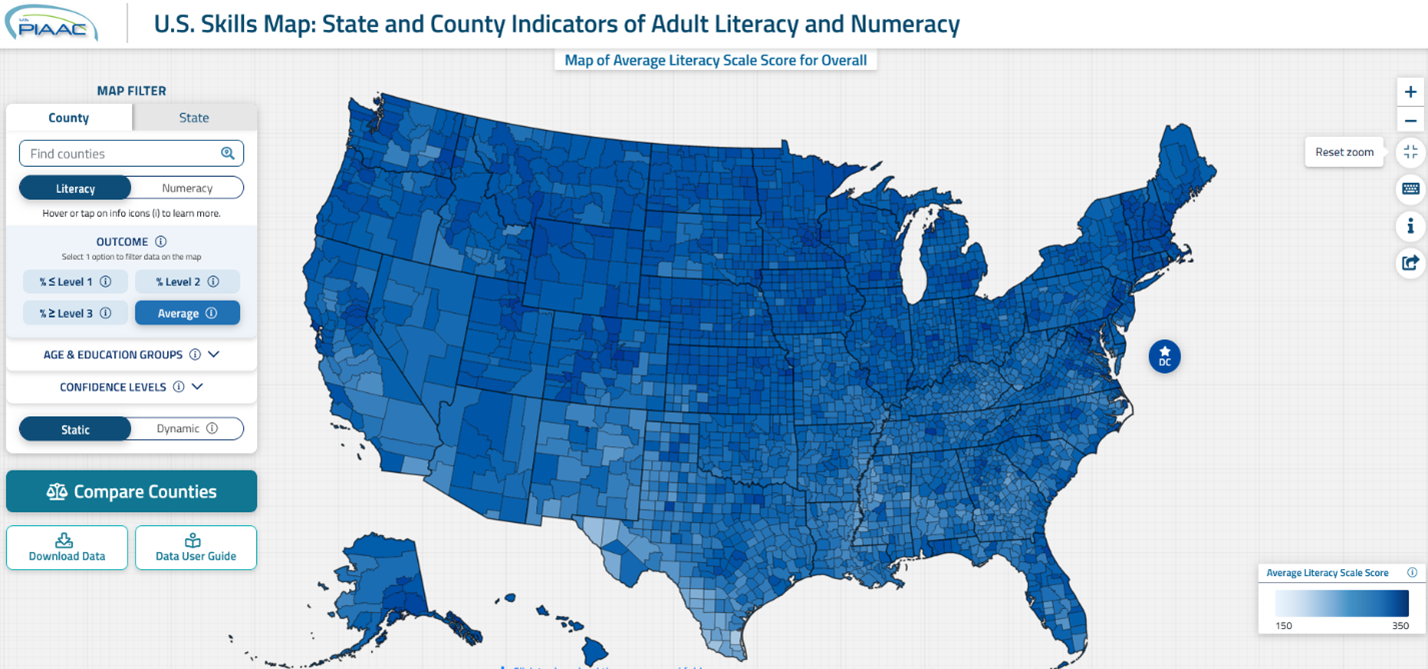Last month, the National Center for Education Statistics (NCES) kicked off a major survey of adults (ages 16–74) across the nation to learn about their literacy skills, education, and work experience. Information collected through this survey—officially known as Cycle 2 of the Program for the International Assessment of Adult Competencies (PIAAC) in the United States—is used by local, state, and national organizations, government entities, and researchers to learn about adult skills at the state and local levels (explore these data in the PIAAC Skills Map, shown below).

Specifically, these data are used to support educational and training initiatives organized by local and state programs. For example, the Houston Mayor’s Office for Adult Literacy has used the PIAAC Skills Map data in developing the Adult Literacy Blueprint, a comprehensive plan for coordinated citywide change to address the systemic crisis of low literacy and numeracy in the city. In addition, the Kentucky Career and Technical College System developed a comprehensive data-driven app for workforce pipeline planning using the county-level PIAAC Skills Map data as one of the education pipeline indicators.
This is not the first time NCES is administering PIAAC. NCES collected PIAAC data three times between 2011 and 2017, when the first cycle of this international study was administered in 39 countries. Developed by the Organization for Economic Cooperation and Development (OECD), PIAAC measures fundamental cognitive and workplace skills needed for individuals to participate in society and for economies to prosper. Among these fundamental skills are literacy, numeracy, and digital problem-solving. Data from the first cycle of PIAAC (2011–17) provided insights into the relationships between adult skills and various economic, social, and health outcomes—both across the United States as a whole and for specific populations of interest (e.g., adults who are women, immigrants, older, employed, parents, or incarcerated). The OECD and NCES have published extensively using these data.
The current cycle (Cycle 2) of PIAAC will resemble the first cycle in that interviewers will visit people’s homes to ask if they are willing to answer background questionnaire and take a self-administered test of their skills. However, unlike the first cycle when respondents could respond to the survey on paper or on a laptop, this cycle will be conducted entirely on a tablet. PIAAC is completely voluntary, but each respondent is specifically selected to provide invaluable information that will help us learn about the state of adult skills in the country (participants can also receive an incentive payment for completing the survey).
PIAAC’s background questionnaire includes questions about an individual’s demographics, family, education, employment, skill use, and (new in Cycle 2 and unique to the United States) financial literacy. The PIAAC test or “direct assessment” measures literacy, numeracy, and (new in Cycle 2) adaptive problem-solving skills of adults.1
Each sampled person’s response is not only kept confidential but also “anonymized” before the data are released (so that no one can ever definitively identify an individual from personal characteristics in the datafile).
The international report and data for PIAAC Cycle 2 is scheduled to be released by the OECD in December 2024.
Be sure to follow NCES on Twitter, Facebook, LinkedIn, and YouTube and subscribe to the NCES News Flash to stay up-to-date on PIAAC report and data releases and resources.
By Saida Mamedova, AIR, Stephen Provasnik, NCES, and Holly Xie, NCES
[1] Data is collected from adults ages 16–74 in the United States and ages 16–65 in the other countries.